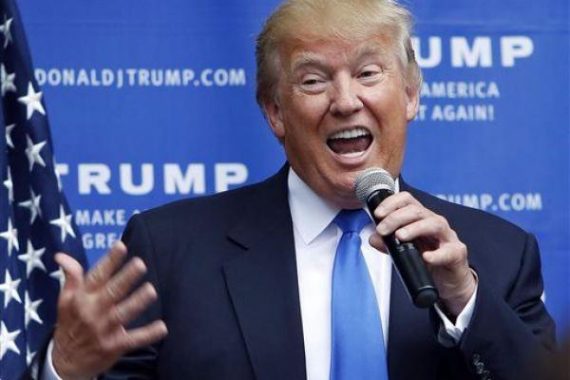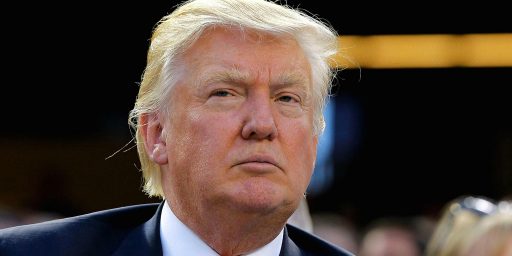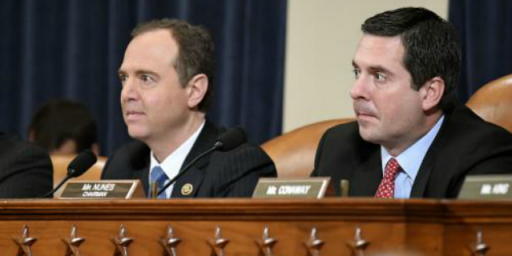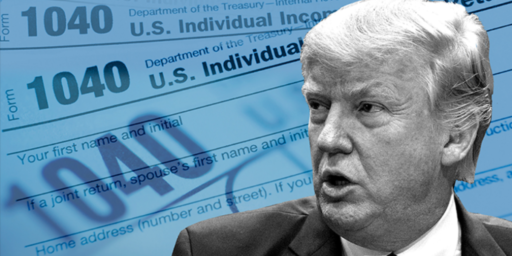Top Republican Adviser Tries To Help Down Ballot Candidates Prepare For Trump As Nominee
A leaked memo from a top Republican adviser tries to tell vulnerable Senate candidates how to deal with the possibility that they'll be stuck with Trump on the top of the ticket.
Just one day after reports of top Republicans expressing worry about the impact that Donald Trump could have not just on the party’s chances of winning the White House in 2016, but also on down ballot races such as the battle for control of the Senate, The Washington Post’s Robert Costa and Philip Rucker are out with a report that a top adviser to Senate Republicans is suggestion that the best way for Republican Senate candidates to respond to the Trump phenomenon is to be more like Donald Trump:
Donald Trump has become such a force in the Republican Party that the official overseeing next year’s Senate races has proposed a delicate strategy for GOP candidates: Tap into Trumpism without mimicking Trump.
In a seven-page confidential memo that imagines Trump as the party’s presidential nominee, the head of the National Republican Senatorial Committee urges candidates to adopt many of Trump’s tactics, issues and approaches — right down to adjusting the way they dress and how they use Twitter.
In the memo on “the Trump phenomenon,” NRSC Executive Director Ward Baker said Republicans should embrace Trump’s tough talk about China and “grab onto the best elements of [his] anti-Washington populist agenda.” Above all, they should appeal to voters as genuine and beyond the influence of special interests.
“Trump has risen because voters see him as authentic, independent, direct, firm, — and believe he can’t be bought,” Baker writes. “These are the same character traits our candidates should be advancing in 2016. That’s Trump lesson #1.”
Baker’s memo, titled “Observations on Donald Trump and 2016,” amounts to a clear-eyed approach to the Trump challenge, to which many Republican elites have responded with only hand-wringing and the vague hope that somehow, someday it will disappear. In fact, the memo posits that Trump could build a powerful enough coalition to win the general election. Regardless of how far Trump’s candidacy ultimately goes, the memo is evidence of the effect he has had on his party.
Still, Baker sees limits to being like Trump. He writes that it is prudent for Senate candidates to craft their own political brands distinct from Trump’s and to distance themselves by quickly condemning his more controversial comments, such as “wacky things about women.” He cautions candidates against “piling on” Trump, however, warning that Republicans up and down the ballot would suffer if the GOP vote was divided or depressed.
Implied in the memo is an understanding that the national party would back Trump if he secured the nomination — managing his candidacy rather than disowning him as the standard-bearer.
The memo was dated Sept. 22 and addressed to NRSC senior staff members, but it since has been shared more widely and has become the subject of considerable discussion at the highest levels of the party in recent weeks as Trump continues to lead polls in early-voting states and nationally.
(…)
Baker begins his memo by foreshadowing Trump accepting the party’s nomination at the Republican National Convention in July in Cleveland. He draws a historical comparison to Wendell Willkie, a businessman and political outsider who won the GOP nomination in 1940 but lost to Franklin D. Roosevelt, who secured his third term.
Baker writes that Republicans must “understand the changing environment and recalibrate now.” For instance, he writes, “Trump is saying that the Emperor has no clothes and he challenges our politically correct times. Our candidates shouldn’t miss this point.”
Baker explains how Trump has connected with voters, especially when it comes to trade with China and immigration. “Trump will continue to advance those messages, but you don’t have to go along with his more extreme positioning,” Baker writes. “Instead, you should stake out turf in the same issue zone and offer your own ideas.”
Addressing Trump’s controversial past statements about women, Baker writes, “Houston, we have a problem.”
“Candidates shouldn’t go near this ground other than to say that your wife or daughter is offended by what Trump said,” Baker adds. “We do not want to re-engage the ‘war on women’ fight.”
Although some of Baker’s recommendations are unique to the current environment, many are standard tactics employed in campaigns past, such as showcasing “citizen narrators” or talking about “basic solutions” to policy problems to make candidates appear as accessible as Trump. This shows the conundrum the GOP is in: In grappling with Trump, it does not have many new tools at its disposal.
Time and again, Baker frames a future with Trump atop the ticket as an intense high-wire act for other Republicans. He calls Trump “a misguided missile” and says he “is subject to farcical fits.” With grim candor, Baker writes that he foresees a campaign year in which candidates repeatedly will have to fend off questions from reporters about the businessman’s comments and behavior.
“It is certain that all GOP candidates will be tied in some way to our nominee,but we need not be tied to him so closely that we have to engage in permanent cleanup or distancing maneuvers,” Baker writes, adding, “Don’t get drawn into every Trump statement and every Trump dust-up.”
(…)
Baker encourages campaigns to “up the vibe and change the look.”
“Voters are on to you when you do the standard walk and talk through a business, school, or factory,” he writes. He adds that candidates should “lose the suit and visit people in their homes and places of work.”
Baker also takes cues from Trump’s prolific use of social media to drive his message. “Promote tweets that push reforms or condemn Washington’s dysfunction,” he writes.
He warns against being distracted by Trump. “The Trump show may be going on, but back home our families are in a fight for their livelihoods,” he writes. “Always bring the campaign back home to real people and their daily struggle.”
Reading the memo, which I’ve embedded below, much of what Baker writes reads as the kind of standard advice that would apply to a candidate for Senate, or any office really. Candidates are advised to focus largely on their own races and connecting with the voters in the state that they are running in rather than focusing, or allowing themselves to be diverted by, what may be going on at the national level. Although it’s not directly stated, it’s also implied that candidates should avoid campaigning with Trump if it appears that its something that would likely to hurt them in their own campaigns. Again, this is not unusual advice for candidates of either party. On more than one occasion in recent years, we’ve seen candidates for Governor, Senate, or Congress avoid appearances with Presidential candidates in states where the candidate is unpopular. For example, last year, as the 2014 midterms approached, Missouri Senator Claire McCaskill said that she probably would not want President Obama campaigning with her if she were up for re-election that year, which was a step that several Democratic candidates in red and purple states took last year out of concern that being tied to a President unpopular outside the Democratic Party in their state would do more harm than good. This is a strategy that candidates in both parties have used in the past, to varying degrees of success, so it’s no surprise to see it suggested here.
Beyond that standard advice, though, it strikes me that Baker’s analysis may be too optomistic in assuming that Republican candidates can cherry-pick from the Trump playbook and at the same time avoid being tied too closely to his most controversial aspects in the event he becomes the nominee.
First, it occurs to me that Baker, like many other analysts may be overstating the impact and the usefulness of the anti-establishment populism that Trump taps into outside of the phenomenon of Trump himself. Other candidates have and are using the same rhetoric that Trump is using in his campaign on a regular basis, and they aren’t doing nearly as well as Trump has been doing for the past five months. This suggests that the Trump phenomenon is tried to Trump himself, his personality and the image that he has created for himself as a celebrity over the past thirty years, and that it can’t simply be copied and applied by politicians that, whatever else the might be, are no Donald Trump when it comes to personality or fame. Additionally, given the fact that a big part of Trump’s populism is an attack on politicians who accept donations from big money donors, one has to wonder how a candidate for Senate who does just that is going to be able replicate the Trump message.
The second problem with the advice Baker gives is that it seems unlikely to me that any Republican candidate for Federal office is going to be able to avoid the inevitable associations with Donald Trump if he were the nominee. The only probably exceptions to this would seem to be long-term incumbents who don’t really have to worry about re-election such as Lisa Murkowski in Alaska, Charles Grassley in Iowa, Mike Crapo in Idaho, Richard Shelby in Alabama, and other incumbents running in deeply red states who are unlikely to be in trouble no matter who the nominee. Whether they campaign with him or not, a candidate for office in a year when Donald Trump is at the top of their party’s ticket is going to have to deal with what Trump says on a daily basis, and will likely see their campaign distracted by responding to questions about it, regardless of how much they try to focus on their own race. Combine that with the reality of Trump’s very high unfavorability ratings, especially outside the Republican Party, and the problems that down ballot candidates would face if Trump were the nominee start to become rather obvious.
None of this is to say that the GOP is doomed if Trump is the nominee. It’s even conceivable that they could narrowly hold on to the Senate were he the nominee and ended up losing the General Election. However, it would be unlike any General Election we’ve seen in quite some time and it doesn’t seem like this standard, rather milquetoast, advice is going to help a candidate for Senate or Congress in a marginal state or district very much at all.
Here’s the memo:







Trump is pulling off a highwire act, lying through his teeth while convincing his supporters he is “authentic”. Not every politician is this skilled of a liar, and not every voter is as much of a gullible rube as 30% of the Republican voters seem to be. At the very least in a general election some of these Senate candidates are going to have to distance themselves from Trump unless they want to appear crazy, or become former Senators.
How, pray tell, do they come to the conclusion that they can ‘manage’ a loose canon, not financially beholden to them, whose appeal to a lot of that 30% of the base is that he isn’t an establishment Republican?
Of course, his appeal to others is based on what a panelist on the Nightly Show (correctly imo) identified as people who like bullies – the folks who wish they could have been or could be original-timeline Biff in “Back to the Future”.
Trump does appear to have a real lock on 25-30% of the Republican voter base while the remaining forty seven candidates are splitting the rest of the pie fairly evenly. It will be interesting to see if it is possible to nominate a regular GOP pol without alienated the Trump base into staying home on Election Day. It is somewhat smart for the party pros to imagine him as the standard bearer; it would have been very smart if the party pros would figured out a way to tap into Trumps’ base without empowering him in the first place.